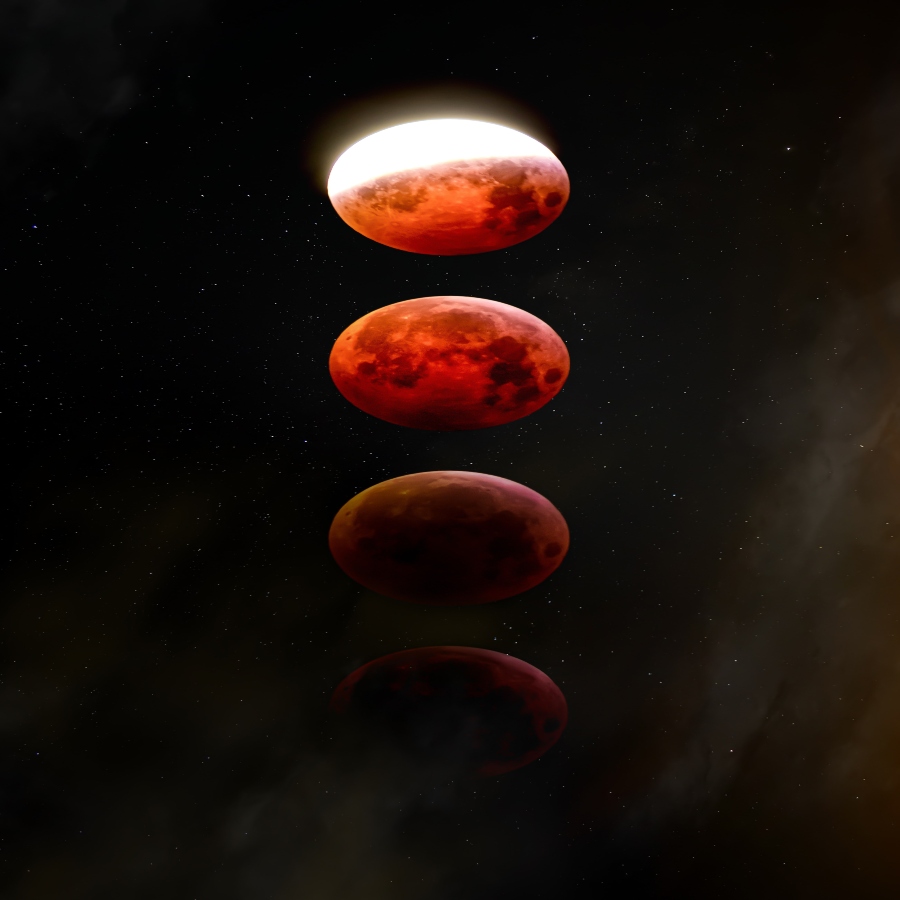But now there are only two brothers and one moon.
At the end of my seven-day shift, I hang the blue lantern on my remaining brother’s door. His whole family is awake, to welcome me back and crater him with goodbyes, and the children smell like creosote, like they’ve been out in the rain. Once they’re back asleep, my brother and I drink liquor made from prickly pear and wait out the three hours before his shift begins. We used to talk about very little, but now there is only one moon, we talk about everything. My teeth ache from our everything, sweetness of that distilled cardinal fruit.
I don’t tell my remaining brother about how, a week before weeks before he emptied the other lantern’s fuel across the desert and sparked a blue wildfire, our gone brother stood behind me and traced my shoulder blades, squeezed a handful of my trapezius, hummed a that’ll do to himself and took into the desert for the last time.
When I return home to my husband and three children, they don’t wake—with my shift is over, we have a whole week to resume our lives before my remaining brother’s shift ends and mine repeats. When I sleep, the remaining moon passes across the night sky, still simmering melt-rock red from where its little brother embraced it too hard after veering off course. After my gone brother scarred the desert with blue wildfire. In the morning, my husband and I collide with each other in bed, him kissing every red pimple where a cactus had once spined me. He charts seven moonrises and moonsets in the pains that cycle my body, but no kiss seals away much of this. Then the children are awake, eager for the week we’ll spend together, to tell me of what I’ve missed during my transit. The storm that stripped the palm trees. The expected breakup. How they counted every star in the night sky. The unexpected breakup. Their intricate weather forecasts for the next twenty-one days, each whispered like a secret.
I wonder if they would follow their siblings anywhere, if they can read each other better than my remaining brother and I could the brother we lost, or, like the moon, they only see half the people they love.
I tide out time to spend with my gone brother’s family. His wife steadies herself against the nearest solid object when his children ask me to play daddy horsey. These children are younger than mine but too old for a game like this; I still fall to the polished concrete floor and let them climb onto my back, one by one by one. They rein me by my shoulders and hair, which must look like their father’s, and when I neigh and rear up on my knees, they cackle so deep they crack, crying, like they’ve forgotten how two moons used to skip across the sky and now there is only one.
At the end of my time off, my husband pins our bodies together next to the firepit and asks if I remember the days just after two moons became one. How the jackrabbits carried the blue lantern across the desert to give us remainders—two brothers, three spouses, nine children—time to mourn and reunite. How we trundled on the mountain trails in a long line and pointed out new-to-us birds, trying to ignore the fire in the sky. Fled to the spastically-lit carnival and cherished the guarantee of the Ferris wheel. Pulled each other from our waxing darks. He always asks if we could do that again: form a different kind of whole. I promise I’ll be back in a week; I almost mean it in full.
When my remaining brother hangs the blue lantern on my front door and lets himself in, I pour two tumblers of prickly pear liquor and lead him into the garage. The vintage two-seater convertible, which the three of us once paid a fortune to have imported to this faraway place, slumbers like a tortoise. For years we meant to restore it together, even though there were three of us and only two seats. When I peel back the cover, a wave of dust, like the debris that coagulated and charred in the sky the night three brothers become two, unfolds between us. We sit on the two seats while he tells me how, during his shift, he fell in love with a mirage and tried to convince a Gila monster to bite him on the neck. How he misses the small blue moon, the way it whistled across the sky, more than he misses our gone brother.
Everything is often too much. Why a moon goes full only once a month?
I leave with the blue lantern. My rendezvous with the remaining moon is an hour’s walk east of where we live. The saguaros tip their crowns and lean out of the path. Roadrunners patter happily alongside me. Burrowing owls unscrew themselves from their tunnels to ask me about my children, who have once again become a single body, moving together, casting my shadow, or casting me in dark.
In the quiet hours, I stare into the blue lantern’s light and wonder how it felt for my gone brother to open the cap and pour its contents across the wands of ocotillo and limbs of cholla that hold starlight in their spines. Whether the fuel burned on its own, or whether he needed a spark. What the remaining moon might think upon rising in the east, seeing another blue wildfire. Would it be as scared as I? Would it wander into a different orbit? Stop to say goodbye? I wonder if it might still ask to stay.

